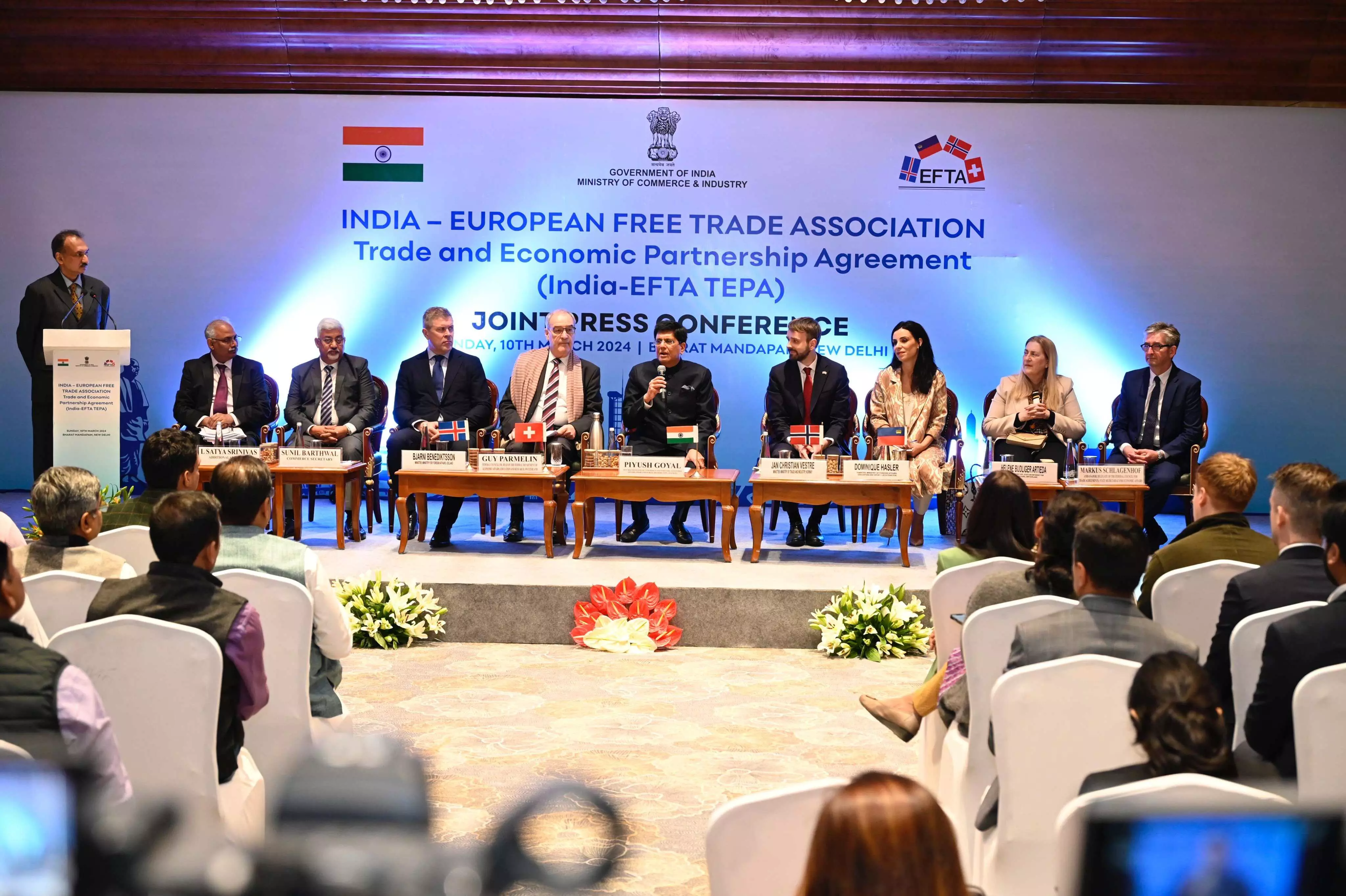Sujit Nair's TEPA analysis: India's game-changing deal with EFTA
It isn't just about numbers on paper; it is about creating tangible opportunities for growth, innovation, and prosperity across diverse sectors in India and the EFTA countries
image for illustrative purpose

Hyderabad: India has inked a modern and ambitious Trade and Economic Partnership Agreement (TEPA) with the European Free Trade Association (EFTA), marking a historic milestone in international trade relations. This groundbreaking agreement is the first Free Trade Agreement (FTA) India has signed with four developed nations within the European economic bloc.
For the first time in the history of FTAs, a binding commitment of $100 billion in investment and the creation of 1 million direct jobs over the next 15 years has been secured. The agreement is poised to provide a significant boost to India's 'Make in India' initiative, offering ample opportunities to the country's young and talented workforce. Moreover, TEPA is set to open a window of opportunity for Indian exporters to access vast European and global markets.
The comprehensive TEPA consists of 14 chapters, focusing on crucial aspects such as market access related to goods, rules of origin, trade facilitation, trade remedies, sanitary and phytosanitary measures, technical barriers to trade, investment promotion, market access for services, intellectual property rights, and trade and sustainable development, among others.
EFTA, an important regional group, holds several growing opportunities for enhancing international trade in goods and services. Among the EFTA countries, Switzerland emerges as India's largest trading partner, followed closely by Norway.
Sujit Nair(SN), a notable figure in Track 1.5 Diplomacy within the India-UK/India-EU corridor, has played a pivotal role in strengthening India's ties with the EU and the UK. With 14 years of experience under his belt, Nair has conducted 25 engagements at the UK Parliament, and 4 years at the European Parliament, and spearheaded various campaigns aimed at fostering India's relations with these significant partners.
In the first part of a series of exclusive discussions with Bizz Buzz(BB), Nair sheds light on the final points of the $100 billion FDI commitment and key aspects of the TEPA agreement.
BB: The India-EFTA agreement has been in the making for 16 years with 21 rounds of negotiations. What were the key factors that finally led to its fruition? Also please elaborate on how the TEPA is expected to attract $100 billion in foreign direct investment (FDI) over 15 years and generate a million job opportunities?
SN: The Trade and Economic Partnership Agreement (TEPA) between India and the EFTA bloc aims to attract £50 billion in Foreign Direct Investment (FDI) within the first 10 years, followed by an additional £50 billion in the subsequent 5 years. Simultaneously, TEPA is poised to generate one million job opportunities, a significant boost for India’s workforce. Let’s delve into the key aspects:
• Market Access: TEPA facilitates increased trade, investment flow, and human resource mobility. Reliable supply chains, simplified customs procedures, and enhanced access to markets create favourable conditions for business expansion. Additionally, this venture aims to diversify imports from China.
• Investment Focus: TEPA prioritizes market access, sustainable development, and intellectual property rights. By providing access to markets, it encourages heightened business activity, attracting more FDI. Investments across sectors will create a multitude of job opportunities.
• Job Creation: Beyond market access and FDI, TEPA explicitly aims to generate at least one million direct employment opportunities in India. The joint venture also contributes to diversifying imports from China, fostering job creation and increased business activity.
• Innovation: EFTA’s global leadership in innovation and research and development opens up new avenues for collaboration. This mutually beneficial exchange of culture, expertise, and technology will drive innovation and economic growth.
BB: With TEPA aiming to increase FDI from EFTA states by $50 billion within a decade, what sectors in India do you believe will benefit the most from this influx of investment?
SN: The anticipated influx of investment through the Trade and Economic Partnership Agreement (TEPA) is poised to significantly benefit multiple sectors. However, the EFTA bloc’s primary focus areas—Financial Services, Manufacturing and Automotive Industry, Pharmaceuticals and Healthcare, and Renewable Energy and Green Technology—will play a pivotal role in shaping this impact.
Financial Services
• EFTA countries boast robust financial institutions. The agreement encourages investment in banking, financial services, and insurance
• Digital banking, fintech startups, and risk management will drive financial inclusion and innovation
Manufacturing and Automotive Industry
• EFTA’s engineering and automotive prowess aligns with India’s growing appetite in this sector
• Collaborations can lead to setting up production facilities, automation adoption, and supply chain optimization
Pharmaceuticals and Healthcare
• EFTA’s robust healthcare and pharmaceutical industry can accelerate drug discovery and development
• Expertise exchange and infrastructure enhancement will benefit healthcare access in India and promote Indian pharmaceuticals in the bloc
Renewable Energy and Green Technologies
• EFTA nations are committed to meeting Sustainable Development Goals (SDGs). Renewable energy technology—leveraging solar, wind, and hydropower—takes centre stage
• India’s geographic advantage positions it for substantial renewable energy generation. Investments in solar parks, wind farms, and battery storage systems will create roles in installation, maintenance, and research
The TEPA between India and EFTA sets the stage for a transformative era of economic collaboration. It isn't just about numbers on paper; it is about creating tangible opportunities for growth, innovation, and prosperity across diverse sectors in India and the EFTA countries.

